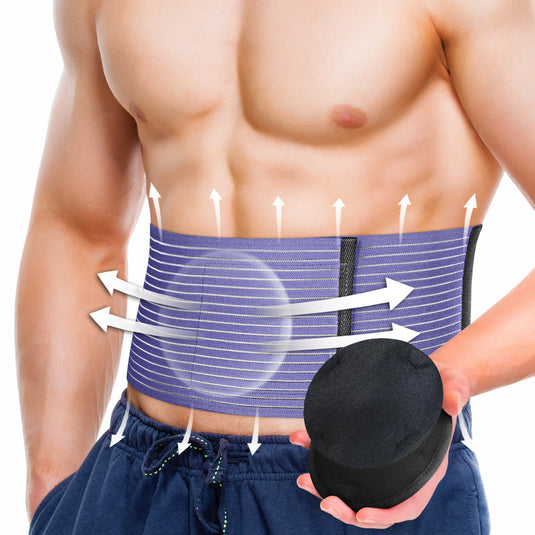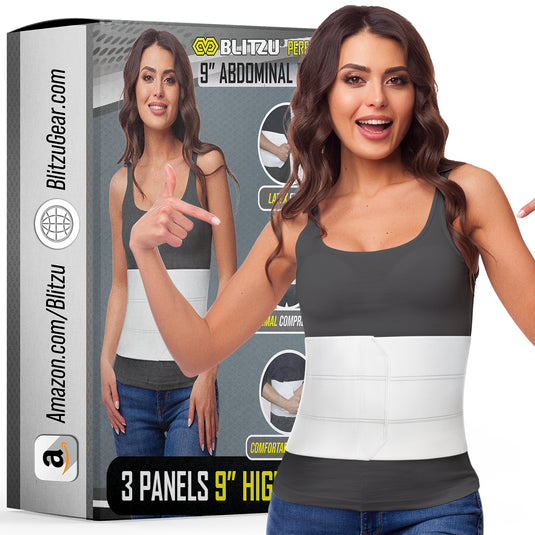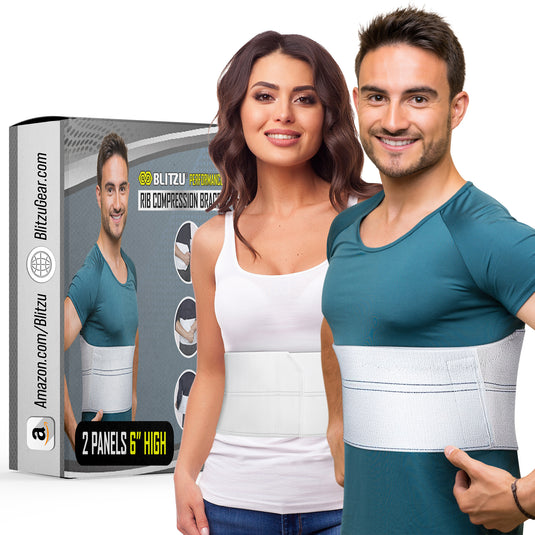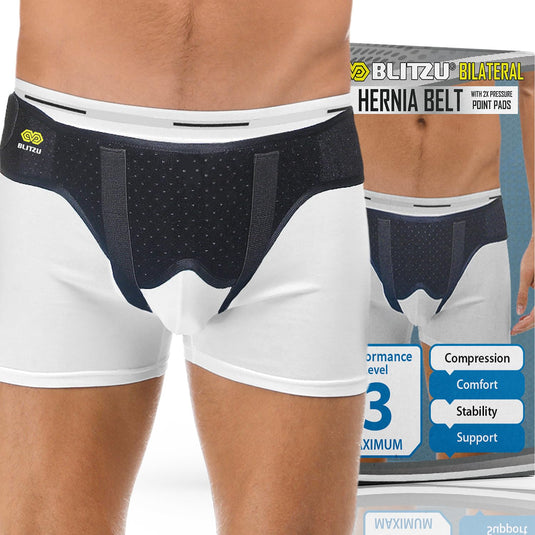Abdominal Hernia Treatment
What Is an Abdominal Hernia?
Your abdomen is covered in layers of muscle and strong tissue that help you move and protect internal organs. An abdominal hernia is a gap in this muscular wall that allows the contents inside the abdomen to protrude outward. An abdominal binder can be used to treat abdominal hernias.
What Causes an Abdominal Hernia?
A hernia happens when an internal organ pushes through a weak spot in your abdominal wall. There are several types of hernia that you can experience including, inguinal hernias, femoral hernias, umbilical hernias and hiatal hernias.
Abdominal hernias are triggered by a combination of pressure and an opening or weak spot in the abdominal wall, causing the pressure to push the organ or tissue through the opening. It is possible to alleviate abdominal hernia pain by applying pressure to the incision site using an abdominal binder.
Abdominal wall hernias can occur in people of any age, including infants. However, the risk of developing a hernia tends to increase as you age. A number of different factors can contribute to the development of that weakness. These factors include:
- Aging
- Chronic coughing
- Collagen vascular disease
- Frequent heavy lifting
- Genetic defects
- History of previous hernias
- Infection (especially following surgery)
- Injuries to the abdominal area
- Obesity
- Pregnancy
- Straining during bowel movements or urination
- Surgical openings
Stomach Hernia Signs and Symptoms
A hernia in the abdomen or groin can produce a noticeable lump or bulge that can be pushed back in, or that can disappear when lying down. Laughing, crying, coughing, straining during a bowel movement or physical activity may make the lump reappear after it has been pushed in. Symptoms of a Stomach hernia include:
- Swelling or bulge in the groin or scrotum.
- Increased pain at the site of the bulge.
- Pain while lifting.
- Increase in the bulge size over time.
- A dull aching sensation.
- A sense of feeling full or signs of bowel obstruction.
Initial treatment of a minor hernia includes avoiding heavy lifting, strenuous exercises and wearing a stomach hernia brace.
Types of Hernias
Inguinal hernias
Inguinal hernia is the most common type of hernia. It takes place when abdominal tissue, such as belly fat or a loop of intestines, bulges through an opening in your lower abdominal wall. This is the wall that separates your abdomen from your groin.
Femoral hernias
A femoral hernia happens when a weakness in the muscle of the groin allows the intestine to bulge through. The first sign of a femoral hernia is usually an unexplained bulge in the groin area or the upper thigh area. Femoral hernias are most common in women, although they can develop in men and children. Older women and women who are very small or thin are at higher risk for developing a femoral hernia.
Umbilical hernias
An umbilical hernia occurs at the umbilicus (belly button) when a loop of intestine pushes through the umbilical ring, a small opening in a fetus’ abdominal muscles through which the umbilical cord which connects a fetus to its mother while in the womb—passes. Umbilical hernias occur most often in newborns, and 90 percent will naturally close by the time the child reaches 5 years of age.
Incisional hernias
Incisional hernias result from a weakening of the abdominal muscle due to a surgical incision. An incisional hernia can occur for a number of specific reasons; individuals who participate in excessive or premature physical activity after surgery, gain considerable weight, become pregnant or increase abdominal pressure in any other way before the incision is fully healed are especially at risk for an incisional hernia. Incisional hernias are most likely to occur within three to six months post-surgery but can happen at any time.
Hiatal hernias
A hiatal hernia occurs when the upper part of your stomach pushes up through your diaphragm and into your chest region. Hiatal hernias don’t always cause symptoms. Hiatal hernia symptoms may include heartburn, acid reflux, and chest pain.
Abdominal Hernia Treatment
Abdominal wall hernias that have no associated symptoms may not require any treatment at all. Your doctor will discuss your options with you which may include surgery or watchful waiting. Larger hernias, however, or hernias that are causing pain, may require surgical repair or a hernia belt to relieve pain as well as to prevent complications.
There are two types of surgical hernia repair: open and minimally invasive surgery. The type of surgery chosen will depend on the severity and type of hernia you’ve developed, the anticipated recovery time, your past medical and surgical history, and your surgeon’s expertise. A post-surgical abdominal binder is recommended after abdominal hernia repair surgery to protect the incision site and speed up recovery.
Self-Care for Hernias
- Eat a number of smaller meals rather than 3 larger meals each day. This will help put less pressure on your stomach.
- Drink most fluids between meals (rather than at meal times). Try avoiding carbonated beverages.
- Try avoiding foods and beverages that can aggravate symptoms of reflux, such as citrus fruits, spicy foods, chocolate, tomato-based foods, alcohol, and caffeine-containing drinks such as tea, coffee and cola.
- Avoid fatty foods, as they relax the sphincter muscle in your lower oesophagus and slow down stomach emptying, which allows more time for acid to reflux into your oesophagus.
- Try to wait a couple of hours after eating before you do any exercise.
- Do not lie down after eating. Always wait at least 2 to 3 hours before lying down or going to bed. By then, most of your food will have passed into your small intestine and can’t flow back into your oesophagus.
- Raise the head of your bed by about 10-20 cm if you can. The effects of gravity will help stop stomach acid from moving into your oesophagus when you’re asleep. It’s best to raise the head of the bed by inserting something (such as a piece of wood or a brick) between the floor and the bed at the head end, rather than using pillows to do this, because pillows tend to increase pressure on your abdomen.
- Avoid bending over or stooping, especially after eating. Do not lift very heavy objects that cause you to strain. Anything that increases pressure in your abdomen can help push your hiatus hernia further through your diaphragm.
- Try not to wear tight clothing that restricts your chest and stomach.
- If you are taking non-steroidal anti-inflammatory drugs (NSAIDs) for pain relief and are suffering from heartburn, you may need to change your medication. Certain medicines, including NSAIDs, can affect stomach acid secretion. Talk to your doctor if you are unsure.
- Give up smoking! Smoking increases stomach acid reflux.
- If you are overweight, losing weight is one of the most important things you can do to reduce the pressure on your stomach and reduce symptoms. Discuss with your doctor a safe weight loss plan that is suitable for you.






